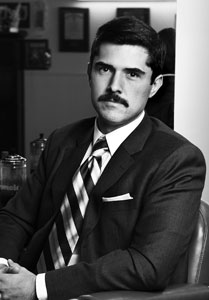The Art of Manliness
 Teddy Roosevelt. Atticus Finch. Ron Swanson. These men embody the kind of masculinity that Brett McKay and his wife, Kate, try to examine with artofmanliness.com, a blog dedicated to uncovering the lost art of being a man.
Teddy Roosevelt. Atticus Finch. Ron Swanson. These men embody the kind of masculinity that Brett McKay and his wife, Kate, try to examine with artofmanliness.com, a blog dedicated to uncovering the lost art of being a man.
Brett grew up in Edmond and graduated from Edmond North High School in 2001. He started the blog in January 2008 while attending law school at the University of Tulsa. Reading headlines in men’s magazines, he noticed that they all offered the same things: tips on how to get six-pack abs and how to pick up women, and they pushed the idea that real men buy $500 suits. They were selling a fantasy lifestyle, so Brett decided to start the men’s magazine he always wanted to read.
“Word started spreading and here we are four years later with two books and a really big following on the ’net,” he says.
Kate started helping with the site when it got too big for one person to handle. She has a bachelor’s degree in history and a master’s degree in religion. “Her history background helps out quite a bit. We talk a lot about the historical aspects of masculinity in America,” he explains. She also was a history professor at Tulsa Community College before they started doing the site full-time.
In a typical week, they publish articles Sunday through Wednesday, and they work together on everything they write. They spend a lot of time looking for images in antiques stores, public domain sites and old magazines. They have written more than 1,000 articles, the website has more than 125,000 daily subscribers and the site enjoys 7,000,000 page views per month. Running “The Art of Manliness” has become a full-time job for the couple.
But, Brett and Kate don’t claim to be experts on masculinity. “I’m learning right along with these guys,” Brett says. “Whenever I write something, I try to live it.” Brett wrote an article on how to change the oil in a car, but he had never done that before so he had to do it. They write a lot of articles on being a better husband or a better father. “You can’t help but be changed by that,” he says.
Sometimes Kate holds it over his head. If he forgets to hold a door for her, she might remind him that he just wrote an article about that. “It’s helping me become a better man, I think,” says Brett. “I have a lot to learn. There’s so much out there for me that I could do to improve my life, it’s kind of humbling and it’s kind of daunting, too, but you just take it one day at a time.”
The site’s monthly podcast offers interviews with people who may have insights on masculinity in America today or people who have improved themselves. Past guests have included a historian on freemasonry, a counselor, fitness experts and Nick Offerman, an actor famous for his role as Ron Swanson on NBC’s “Parks and Recreation.” “I love that character,” Brett says of the mustachioed, self-reliant caricature of masculinity. “It’s one of the best characters that television has put out in a while.” In real life, Offerman also is a professional woodworker, so Brett interviewed him on the role of Swanson and his work as a craftsman.
Brett says TV characters like Swanson are a good sign of where this nation’s perception of masculinity is headed. “You see it all over the place,” he points out, in products made for men, the revival of Old Spice deodorant, sites like his that are starting to pop up that encourage men to be better at being men and media that revive aspects of masculinity and spin it into something new.
Artofmanliness.com is polished with a vintage aesthetic filled with old photos and drawings of men with pomade-slicked hair and handlebar moustaches. “I’m sort of a nostalgic guy, and whenever I think of manly men I think of men like my grandfather and men of that generation.”
Teddy Roosevelt is one of Brett’s personal heroes. He thinks the former U.S. president possessed many of the attributes that exemplify masculinity, like the idea of a strenuous life, of being a renaissance man — an outdoorsman but also an intellectual. Atticus Finch from the classic novel “To Kill a Mockingbird” is another example. Finch is compassionate, very strong and stands up for what’s right and what he believes in.
Brett says the biggest factor in society that is hurting men is consumer culture. “It makes us so passive,” he explains. “Instead of going out there and creating things and being men of action, we sit around and passively consume entertainment.” Brett decries the lifestyle of excessive TV-watching, video games, and Web-surfing. He cites that, anthropologically, a mark of manhood is when a person starts to produce more than they consume. Brett thinks a lot of men, particularly in their 20s, aren’t doing that.
“I think that men are looking for something more out there among all the content that’s made for men,” he says. “A lot of young men, particularly in their 20s, are trying to figure out what it means to be a man.” Brett says there aren’t many great resources out there, and that people are tired of the superficiality of a lot of it, so they keep coming back to his site. “Without fail, for the past four years, we’ve doubled our traffic every year,” he states. “We’re on track for doubling it again this year.”
He says one of the keys to a successful blog is consistency. “You can’t just sort of write every now and then,” he warns. “Write great content. Don’t write about what your cat did that day. You want to be as useful as possible to people.” As for gaining traffic, Brett suggests, start with your friends and family and find a website or blog that’s a little bigger but in the same niche as yours and write a guest post for them so that you can expose your own blog to new readers who might enjoy your content as well.
Find them on Facebook or submit an article to “The Art of Manliness,” by emailing brett@artofmanliness.com.



